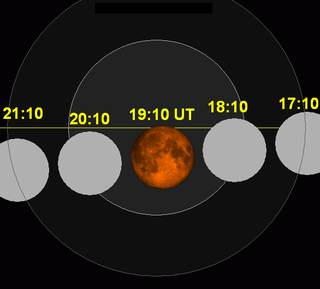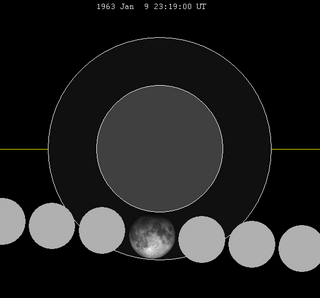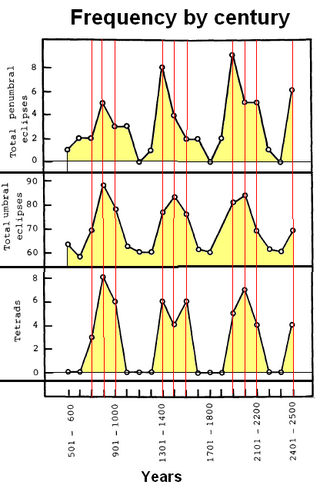There are several lists of lunar eclipses

A penumbral lunar eclipse took place on 14 March 2006, the first of two lunar eclipses in 2006.

A total lunar eclipse took place at the Moon's descending node of the orbit on Tuesday, September 16, 1997, the second of two lunar eclipses in 1997. A shallow total eclipse saw the Moon in relative darkness for 1 hour, 1 minute and 30.8 seconds. The Moon was 19.094% of its diameter into the Earth's umbral shadow, and should have been significantly darkened. The partial eclipse lasted for 3 hours, 16 minutes and 28.2 seconds in total. The penumbral eclipse lasted for 5 hours, 8 minutes and 20.1 seconds. The partial eclipse lasted for 3 hours, 16 minutes and 28.2 seconds. The total eclipse lasted for 1 hour, 1 minute and 30.8 seconds. Maximum eclipse was at 18:46:39.1 UTC. The moon's apparent diameter was extremely large because occurred only 3 hours and 21 minutes past perigee. The Moon was only 356,986 km of the Earth at greatest eclipse.

A total lunar eclipse took place on 15 April 2014. It was the first of two total lunar eclipses in 2014, and the first in a tetrad. Subsequent eclipses in the tetrad are those of 8 October 2014, 4 April 2015, and 28 September 2015. Occurring 6.7 days after apogee, the Moon's apparent diameter was smaller.

A total lunar eclipse occurred on Tuesday, 8 November 2022. The southern limb of the Moon passed through the center of the Earth's shadow. It surpassed the previous eclipse as the longest total lunar eclipse visible from nearly all of North America since 17 August 1989, and until 26 June 2029. Occurring only 5.8 days before apogee, the Moon's apparent diameter was smaller. The next total lunar eclipse will take place on 14 March 2025. A lunar occultation of Uranus happened during the eclipse. It was the first total lunar eclipse on Election Day in US history. This event was referred in media coverage as a "beaver blood moon".

A total lunar eclipse will take place on October 19, 2051. The northern limb of the Moon will pass through the center of the Earth's shadow.
A penumbral lunar eclipse took place on Thursday, March 3, 1988, the first of two lunar eclipses in 1988, the second being on August 27, 1988. Earlier sources compute this as a 0.3% partial eclipse lasting under 14 minutes, and newest calculations list it as a penumbral eclipse that never enters the umbral shadow. In a rare total penumbral eclipse, the entire Moon was partially shaded by the Earth, and the shading across the Moon should have been quite visible at maximum eclipse. The penumbral phase lasted for 4 hours, 53 minutes and 50.6 seconds in all, though for most of it, the eclipse was extremely difficult or impossible to see. The Moon was 2.2 days after apogee, making it 6.1% smaller than average.

A penumbral lunar eclipse took place on Thursday, June 27, 1991, the second of four lunar eclipses in 1991. The moon entered the Earth's penumbra for about 3 hours, and was difficult to see. This lunar eclipse is the predecessor of the Solar eclipse of July 11, 1991.
A penumbral lunar eclipse took place on Thursday, November 8, 1984, the last of three lunar eclipses in 1984. This subtle penumbral eclipse may have been visible to a skilled observer at maximum eclipse. 90% of the Moon's disc was partially shaded by the Earth, which caused a gentle shadow gradient across its disc at maximum; the eclipse as a whole lasted 4 hours and 28 minutes.
A penumbral lunar eclipse took place on Tuesday, May 15, 1984, the first of three lunar eclipses in 1984. This was a deep penumbral eclipse, with the southern limb of the Moon close to the Earth's shadow.

A partial lunar eclipse occurred on 19 November 2021. The eclipse occurred towards a micromoon. This was the longest partial lunar eclipse since 18 February 1440, and the longest until 8 February, 2669; however, many eclipses, including the November 2022 lunar eclipse, have a longer period of umbral contact at next to 3 hours 40 minutes. It was often referred to as a "Beaver Blood Moon" although not technically fulfilling the criteria for a true blood moon (totality).

A partial lunar eclipse will take place on Friday 28 August 2026. The moon will be almost be inside the umbra, but not quite be contained within the umbral shadow at greatest eclipse.

A penumbral lunar eclipse will take place on Tuesday, August 17, 2027. It will cause a subtle dimming as 54.56% of the Moon will cross within Earth's penumbral shadow.

A total lunar eclipse took place on Monday, April 24, 1967, the first of two total lunar eclipses in 1967, the second being on October 18, 1967.

A penumbral lunar eclipse took place on Wednesday, January 9, 1963, the first of three lunar eclipses in 1963.

A total penumbral lunar eclipse is a lunar eclipse that occurs when the Moon becomes completely immersed in the penumbral cone of the Earth without touching the umbra.

A total lunar eclipse will take place on March 25, 2043.

A total lunar eclipse will take place on May 6, 2050.

A total lunar eclipse will take place on April 26, 2051.

A total lunar eclipse will take place on October 30, 2050.




























































































